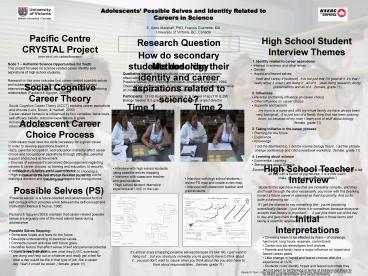Methodology PowerPoint PPT Presentation
1 / 1
Title: Methodology
1
Adolescents Possible Selves and Identity Related
to Careers in Science E. Anne Marshall, PhD,
Francis Guenette, MA University of Victoria, BC,
Canada
- High School Student Interview Themes
- 1. Identity related to career aspirations
- Interest in science and other areas
- Gender
- Hoped and feared selves
- Yeah and I enjoy it science. It is not just
that Im good at it, its that I really enjoy it
when I am doing itall of ityeah doing research,
doing presentations and all of it. (female,
grade 11) - 2. Influences
- Parental and family influence on career choice
- Other influence on career choice
- Supports and barriers
- my mom is a nurse and with my whole family we
have always been very biologicalIt is just sort
of a family thing that has been passing down, so
because of my mom I learn a lot of stuff about
biology - (female, grade 11)
- 3. Taking Initiative in the career process
Pacific Centre CRYSTAL Project (www.educ.uvic.ca/
pacificcrystal/) Node 1 Authentic Science
Opportunities for Youth This project focuses on
science related career identity and aspirations
of high school students. Research in this area
indicates that career-related possible selves and
subsequent plans can flow from specific
career-related internships, intense academic
programs, and important mentoring relationships
(Packard Nguyen, 2003).
Research Question How do secondary students
describe their identity and career aspirations
related to science?
Methodology Qualitative design Semi-structured
interviews and ethnographic observation Possible
Selves (PS) Mapping interviews (Shepard
Marshall, 1999) Observations in high school (HS)
classroom, during student lab internship at
UVic, and during student group presentations
Participants 13 HS students in Biology 11
Career Prep (11F 2M) Biology teacher 5 grad
students, lab manager, project director
Social Cognitive Career Theory Social Cognitive
Career Theory (SCCT) explains career aspirations
and choices (Lent, Brown, Hackett,
2000) Career-related behavior is influenced by
four variables behaviours, self-efficacy
beliefs, outcome expectations goals
Achievement and confidence are key factors for
persisting in science career aspirations.
Time 1
Time 2
- Adolescent Career Choice Process
- Individuals must have the skills necessary for a
given career - in order to develop aspirations toward it.
- SES, parental occupation, and education
indirectly affect career choice and occupational
aspirations through attitudes, parental support
and school achievement. - Sources of adolescent's perceived discouragement
regarding careers career choices a) training
and education, b) security, - c) satisfaction, d) failing, and e) commitment
- High school students feel anxious that time is
running out for - making a decision and that they could make the
wrong choice.
- Interview with high school students using
possible selves mapping - Interview with classroom teacher
- and grad students
- High school student internship experience at
UVIC in the Lab
High School Teacher Interview Students this age
have lives that are incredibly complex, and they
don't walk through the door necessarily, you know
with this working toward a future career in
science as their top priority. And so its quite
a balancing act . .. If I get the chance to say
something like - you're becoming scientifically
literate - I just throw it in sometimes because
everyone accepts that literacy is important . . .
it just jolts them out of the day to day and gets
them thinking of themselves in those terms and
taking a scientific approach
- Interview with high school students review PS
map and create a new map - Interview with classroom teacher and
- grad students
I mean its kind of hard to want to lock in to
choosing a career for the rest of your life when
youre 17. (male, grade 11)
- Possible Selves (PS)
- Possible selves is a future-oriented and
personalized form of self-concept which provides
a link between the self-concept and motivation
(Markus Nurius, 1986) - Packard Nguyen (2003) maintain that
career-related possible selves are arguably one
of the most salient tasks during adolescence - Possible Selves Mapping
- Generates hopes and fears for the future
- Develops understanding of personal values
- Connects current activities with future goals
- Identifies factors that affect sense of self and
personal potential - Can increase motivation
- Initial Interpretations
- Choosing seem to be affected by fears of
challenge, hard work, long hours, expense,
commitment - Career and job stereotypes limit choices
- Parents and family have a major influence on
hoped and feared career paths - Little change in hoped and feared choices after
the experience at UVIC - Students could identify hopes and feared
outcomes they did not seem to be thinking in
terms of behavioural steps to facilitate goal
attainment and avoid problems
and to really be able to see what they UVIC
scientists are doing and help out or whatever
and really get a feel for what a day would be
like in that type of job, like a career day. Yeah
it would be sweet. ( female, grade 11)
Its almost scary mapping possible selves
because its like No, I just want to hang
outbut you obviously someday youre going to
have to think about ityou just dont want to
cause when you think about this you also have to
think about responsibilities(female, grade 11)
Research Team Anne Marshall, Francis Guenette,
Tara Morley, Meghan Atherton, Pei Ling Hsu.

